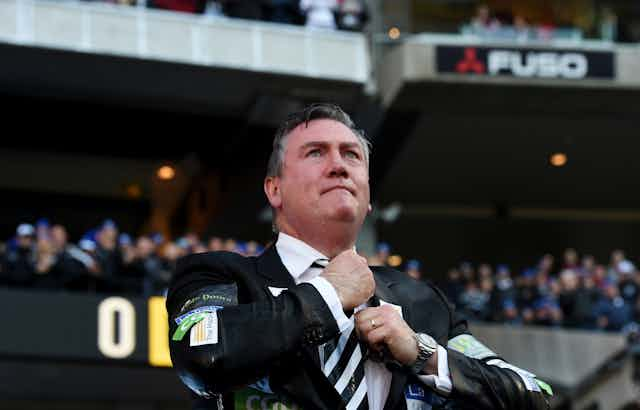AFL journalist Caroline Wilson may have accepted Collingwood president and MMM radio presenter Eddie McGuire’s apology for saying he’d pay money to watch her drown, but the damage is done.
Footy Show star Sam Newman made things worse when he tried to support his mate Eddie, suggesting that somehow gender equality means that sexist abuse is acceptable. This follows Newman’s 2008 attack on Wilson on Channel Nine’s Footy Show, when he groped a mannequin with a cut-out of Wilson’s face.
There is a clear association between gender inequality and a lack of respect for women. This gives some men the impression that it’s acceptable to sexually assault strangers or be violent in their intimate relationships.
The AFL, and Australian society more broadly, has been trying to tackle this issue for the past decade. So what progress has been made?
The impetus for change in the AFL came after the community backlash against a series of sexual assault allegations against elite players in 2004.
The AFL responded by carefully crafting a Respect and Responsibility policy and anti-sexual harassment and discrimination procedures to change the sport’s culture.
The Respect and Responsibility policy promotes gender equality and the right of everyone in the community to feel safe, respected and valued in the AFL. Since 2006, this has involved rule changes, a respectful relationships education program for elite, state-based and community players, and a six-year culture change program in Victorian community clubs.
Like most companies, the AFL has gone to great lengths to promote itself as a responsible corporate citizen and protect its brand. But culture change involves much more than just brand protection.
The goal of ethical culture change is a consistently positive association between the brand and everything it stands for. Yes, this is a form of proactive brand management. But it involves consistency rather than reactive, incident-based crisis responses.
Yet when incidents of abuse or sexism emerge, the AFL’s response has been more concerned about reputational damage than a failing of cultural change within the organisation.
Between 2009 and 2012, my colleagues and I researched the implementation of the Respect and Responsibility policy throughout the AFL. We found that all levels of the organisation understood the importance of both their corporate and personal brand, but some competing tensions emerged.
Players are expected to be disciplined, tough, competitive, team players on-field. But off-field they are expected to be ethical bystanders prepared to challenge team-mates’ unacceptable actions should they occur.
For younger or more junior players, this presented a challenge. Some reported they would be unsure, reluctant or uncomfortable to intervene if they thought a team-mate behaved in a way that was out of line with AFL, team or personal expectations.
The primary aim of all clubs is to win games and ultimately premierships. Some AFL players struggle with balancing demands for “hardness” on the field with what some people in the industry consider “softness” off the field.
For younger men, this can work against the goal of ethical culture change and play into a sense of unease about what it means to be a man in relationships with women.
This unease is not helped by the AFL’s response to the likes of McGuire and Newman because the AFL benefits from their role by keeping the game in the media.
Only when the situation blows up does the AFL take a public position, resorting to brand protection through crisis and risk management, rather than using its power to ensure that the values inherent in the Respect and Responsibility policy are reflected in all media associated with the game.
A first step to making Respect and Responsibility a living policy that reflects the AFL in a positive light would be to recognise the ways the organisation benefits from the antics of the likes of McGuire and Newman and intervene to stop their association with the AFL brand unless they change their misogynist behaviours.
The likes of McGuire and Newman are, as media studies professor Catherine Lumby has argued, poster boys for an era that should have ended years ago. Yet they continue to have a powerful influence on others who are uncertain or who share their values about the place of women in society. They represent the tip of an ugly, misogynist iceberg.
Until the AFL is prepared to take a consistent, ethical position on sexism and misogyny in the game, incidents like this will continue to be a problem and contribute to harming the AFL’s brand.

